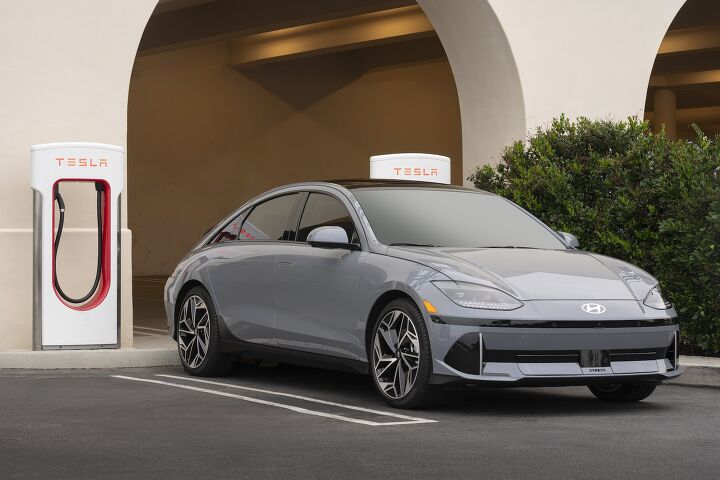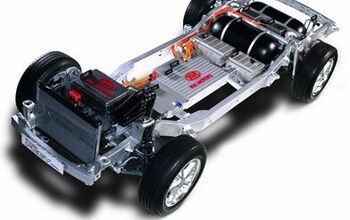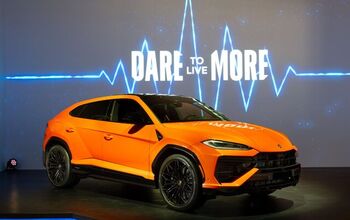Hyundai Latest to Jump on NACS Bandwagon

In what must surely be some of the least surprising automotive news you’ll read today, the corporate duo of Hyundai and Genesis have announced they will be adopting the North American Charging Standard for its EVs. This change will debut in the final quarter of next year.
As an aside, we’ll reiterate what we’ve been saying every time an automaker makes this declaration (and about all of them have, by now): This wholesale shift to NACS, which really wasn’t a “charging standard” at all in the truest sense of the word, is akin to this writer inventing a new grill on which to cook chicken in the backyard, call it a “grilling standard” and then have the likes of Weber and Traeger adopt the design. And likely pay for the privilege to do so.
It's a bit more involved than that, of course. After all, Tesla – like ‘em or lump ‘em – has built the country’s most populous and robust charging infrastructure for electric vehicles.
“Our collaboration with Tesla marks another milestone in our commitment to delivering exceptional EV experiences to our customers,” said José Muñoz, president and global COO, Hyundai Motor Company and president and CEO, Hyundai Motor North America. After typing all that out, it occurs to us that Muñoz must have one hell of a business card.
Owners of existing and future Hyundai EVs with the current CCS will have access to the Tesla Supercharging Network starting in Q1 2025. Hyundai will offer an adapter to these customers. Hyundai will also make adapters available to charge NACS-equipped vehicles at CCS chargers. This is a good thing.
Don’t forget that Hyundai is part of a multi-company group said to be developing a new, high-powered North American charging network with at least 30,000 chargers. The first American stations in this new network are targeted to open next summer. If you’re wondering, Hyundai sold nearly 35,000 of its Ioniq5 and Ioniq6 all-electrics so far this year – Kona EV numbers aren’t broken out – representing about six percent of its total YTD volume of 595,147 vehicles.
[Image: Hyundai]
Become a TTAC insider. Get the latest news, features, TTAC takes, and everything else that gets to the truth about cars first by subscribing to our newsletter.

Matthew buys, sells, fixes, & races cars. As a human index of auto & auction knowledge, he is fond of making money and offering loud opinions.
More by Matthew Guy
Latest Car Reviews
Read moreLatest Product Reviews
Read moreRecent Comments
- Varezhka I have still yet to see a Malibu on the road that didn't have a rental sticker. So yeah, GM probably lost money on every one they sold but kept it to boost their CAFE numbers.I'm personally happy that I no longer have to dread being "upgraded" to a Maxima or a Malibu anymore. And thankfully Altima is also on its way out.
- Tassos Under incompetent, affirmative action hire Mary Barra, GM has been shooting itself in the foot on a daily basis.Whether the Malibu cancellation has been one of these shootings is NOT obvious at all.GM should be run as a PROFITABLE BUSINESS and NOT as an outfit that satisfies everybody and his mother in law's pet preferences.IF the Malibu was UNPROFITABLE, it SHOULD be canceled.More generally, if its SEGMENT is Unprofitable, and HALF the makers cancel their midsize sedans, not only will it lead to the SURVIVAL OF THE FITTEST ones, but the survivors will obviously be more profitable if the LOSERS were kept being produced and the SMALL PIE of midsize sedans would yield slim pickings for every participant.SO NO, I APPROVE of the demise of the unprofitable Malibu, and hope Nissan does the same to the Altima, Hyundai with the SOnata, Mazda with the Mazda 6, and as many others as it takes to make the REMAINING players, like the Excellent, sporty Accord and the Bulletproof Reliable, cheap to maintain CAMRY, more profitable and affordable.
- GregLocock Car companies can only really sell cars that people who are new car buyers will pay a profitable price for. As it turns out fewer and fewer new car buyers want sedans. Large sedans can be nice to drive, certainly, but the number of new car buyers (the only ones that matter in this discussion) are prepared to sacrifice steering and handling for more obvious things like passenger and cargo space, or even some attempt at off roading. We know US new car buyers don't really care about handling because they fell for FWD in large cars.
- Slavuta Why is everybody sweating? Like sedans? - go buy one. Better - 2. Let CRV/RAV rust on the dealer lot. I have 3 sedans on the driveway. My neighbor - 2. Neighbors on each of our other side - 8 SUVs.
- Theflyersfan With sedans, especially, I wonder how many of those sales are to rental fleets. With the exception of the Civic and Accord, there are still rows of sedans mixed in with the RAV4s at every airport rental lot. I doubt the breakdown in sales is publicly published, so who knows... GM isn't out of the sedan business - Cadillac exists and I can't believe I'm typing this but they are actually decent - and I think they are making a huge mistake, especially if there's an extended oil price hike (cough...Iran...cough) and people want smaller and hybrids. But if one is only tied to the quarterly shareholder reports and not trends and the big picture, bad decisions like this get made.


































Comments
Join the conversation
The downside to this decision is that Tesla V3 chargers only go to 400 Volts, while EGMP-platform H/K/G cars cars can be charged at 800 Volts. So filling at a Supercharger today would take twice as long as Hyundai advertises.
But apparently Tesla V4 chargers will go to 800 V, so this will be better for everyone.
https://insideevs.com/news/690142/hyundai-tesla-nacs-win/
Maybe these won’t melt